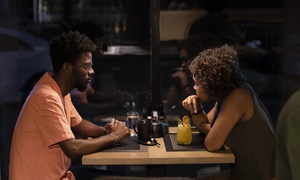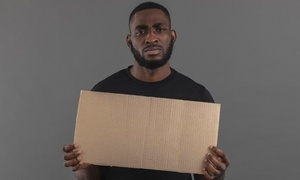<p style="text-align: left;">"Uncle Biodun's House"</p><p><br></p><p>In the dusty heart of Akure, behind peeling green gates and hibiscus bushes left to dry in the sun, lived Uncle Biodun. No one knew exactly what he did for a living anymore — he used to be a lecturer, they said, before “issues” forced him into early retirement. Now, he mostly stayed indoors, his air-conditioner humming while NEPA allowed, always sitting on his verandah with a newspaper he never really read.</p><p><br></p><p>To most, he was just another old man with a paunch, skin like aged leather, and eyes that looked too long at girls in school uniforms.</p><p><br></p><p>The neighborhood knew. But no one said anything. Because Uncle Biodun donated to the church. Because he once paid for someone’s hospital bill. Because he greeted elders with respect and used big English words that made people nod even when they didn’t understand.</p><p><br></p><p>When Ada’s mother lost her tailoring shop in the last flood, she sent Ada to stay with Uncle Biodun for the school term.</p><p><br></p><p>“Just for a while,” her mother said, fingers trembling. “He has generator. He will take care of you.”</p><p><br></p><p>Ada didn’t want to go. She was sixteen, with braids that brushed her back and dreams that felt like they could fly. But poverty does not ask if you’re ready before it swallows you. She packed her things and moved in on a Sunday.</p><p><br></p><p>At first, he was kind. Called her “my dear” and gave her extra meat at dinner. Bought her body sprays she never asked for. Stared too long when she washed plates bent over the sink. She caught him once, eyes stuck to her chest like chewing gum under a desk. He didn’t flinch when she looked back.</p><p><br></p><p>Instead, he smiled.</p><p><br></p><p>“Ada, you are becoming a woman,” he said.</p><p><br></p><p>That night, she locked her door with a chair wedged under the handle.</p><p><br></p><p>But locks are only promises — not guarantees.</p><p><br></p><p>Two weeks later, it rained. Loud, insistent rain that swallowed the sounds of the world. Ada woke up to the click of her door. Uncle Biodun, standing there in boxers, a stench of gin in his breath.</p><p><br></p><p>She froze. He stepped closer.</p><p><br></p><p>“Don’t shout,” he whispered. “You know I’ve been good to you.”</p><p><br></p><p>He touched her thigh.</p><p><br></p><p>Ada didn’t scream. She didn’t cry. She left her body. Let it float up to the ceiling and watch like it was happening to someone else. When it was over, she lay still, the rain now a whisper.</p><p><br></p><p>The next morning, he acted like nothing happened.</p><p><br></p><p>She walked around the house like a ghost. He dropped a new phone on her bed that evening. “For your studies,” he said.</p><p><br></p><p>She didn’t touch it.</p><p><br></p><p>At school, her teachers noticed the change — the girl who once read poetry aloud now sat silent at the back. Her uniform looked looser. Her face was thinner. When one of them asked if she was okay, she said, “I’m fine,” and smiled in that way victims do — a mask, not a feeling.</p><p><br></p><p>One afternoon, she sat in the toilet stall with her knees pressed to her chest and blood soaking through her underwear. She was pregnant.</p><p><br></p><p>She didn’t tell anyone.</p><p><br></p><p><br></p><p>---</p><p><br></p><p>The news broke three weeks later when Ada collapsed during assembly.</p><p><br></p><p>The principal called her mother. The teachers whispered. Someone said it must be one of those small boys in town. But Ada, lying weak in the clinic, finally opened her mouth.</p><p><br></p><p>“Uncle Biodun.”</p><p><br></p><p>The room went silent.</p><p><br></p><p>“No, no, not that Uncle Biodun,” the nurse said. “He’s a good man. He paid for the church roof.”</p><p><br></p><p>But Ada didn’t flinch. “He is the one.”</p><p><br></p><p>It was only then that the cracks started to show.</p><p><br></p><p>A girl in SS2 remembered how he once offered her a ride home and touched her thigh. Another girl said he bought her suya and tried to kiss her in the car. But they hadn’t said anything — because their parents needed school fees paid, because who would believe them?</p><p><br></p><p>In church, the pastor didn’t mention his name. In whispers, they called Ada a liar. “These girls of nowadays,” someone said. “She probably seduced him.”</p><p><br></p><p>Uncle Biodun never went to jail. The police came once, took a statement, and never came back. Rumor was, he gave them an envelope and a handshake.</p><p><br></p><p>Ada was sent back to the village to “heal.” Her mother stopped speaking at church. The pregnancy was quietly “handled.” No one asked how.</p><p><br></p><p><br></p><p>---</p><p><br></p><p>Years passed.</p><p><br></p><p>Ada grew older, but not softer. She studied hard. Won a scholarship. Moved to Ibadan. She never wore skirts above her knees again. She never entered a man’s car alone. She didn’t smile too much or too little.</p><p><br></p><p>Sometimes, when the power was out and the fan stopped spinning, she’d wake up in sweat, heart racing, breath caught in her throat. And the scent — cheap gin and stale sweat — would rise like a ghost from the past.</p><p><br></p><p>Once, she saw him again. At a family friend’s burial. He was older, slower, using a cane now.</p><p><br></p><p>He smiled at her across the compound.</p><p><br></p><p>Ada did not smile back.</p><p><br></p><p>She stood tall, walked past him, and did not greet.</p><p><br></p><p>He looked away first.</p><p><br></p><p><br></p><p>---</p><p><br></p><p>There is no clean ending to stories like Ada’s.</p><p><br></p><p>No jail time. No front-page headlines. Just silence. Shame. And the quiet breaking of a girl who was never meant to carry that kind of pain.</p><p><br></p><p>But Ada lived. She did not forget. She did not forgive.</p><p><br></p><p>And sometimes, survival is the loudest justice of all.</p><p><br></p><p><br></p><p>---</p><p><br></p><p><br></p><p><br></p>




Comments